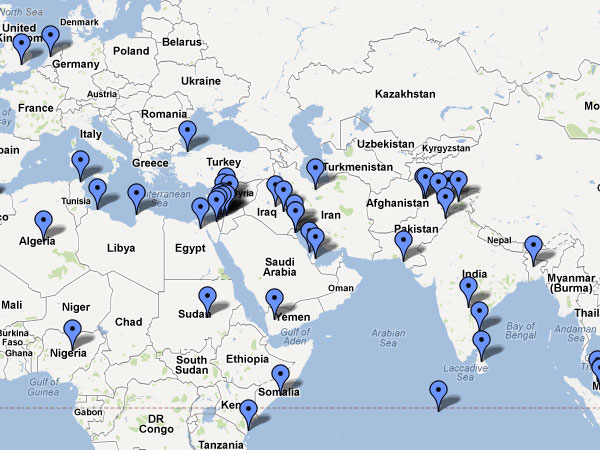 In the New World of indie filmmaking, anyone can make a film using cheap digital tools and then market and circulate it online using (free or inexpensive) tools.
In the New World of indie filmmaking, anyone can make a film using cheap digital tools and then market and circulate it online using (free or inexpensive) tools.That's apparently what happened when a 14-minute film, billed as a trailer for a longer film entitled “Innocence of Muslims,” appeared online. Still available in the US and many other countries around the globe on YouTube as of Sept. 15th, 2012, the 14 minute video portrays the prophet Muhammad as a murdering adulterer who approved of child sexual abuse.
The reaction to “Innocence of Muslims” (apparently a crude but effective attempt to provoke devout Muslims) has been intense and worldwide. Riots erupted across the Muslim world starting on Sept. 11th 2012. On that day, Christopher Stevens, the American ambassador to Libya, and three other Americans were killed in the country's capital of Benghazi, during protests against the film. Subsequently, the American Embassy in Tunisia was torched and there were violent clashes in Sudan and elsewhere. And, as of Sept. 15th, 2012, the protests (thankfully, only a few of them violent) continue around the globe - see the map above.
And the response wasn't limited to street protests. This cheaply-made and (to use a loaded word from the last century) "amateurish" film has gotten the attention of world leaders. Secretary of State Hillary Clinton condemned the film and the White House, walking a fine First Amendment line, reached out to YouTube "to call the video to their attention and ask them to review whether it violates their terms of use.” So far, YouTube's parent company, Google, has only "restricted access to [the trailer for the “Innocence of Muslims,” it's unclear if a longer version even exists,] in countries where it is illegal such as India and Indonesia, as well as in Libya and Egypt, given the very sensitive situations in these two countries."
Leaving aside all the other questions swirling around this particular (apparently vile, I haven't watched it) film and the shameful violence in response to it, it is worth noting just how powerful one motion picture - made for a small amount of money and circulated for free online - has become.
While propaganda has existed for almost as long as human history, the internet and the new digital tools for making motion pictures are changing how provocative messages can be produced and circulated.
As Michael Hogan observed in a Sept. 14th, 2012 Huffington Post piece: "Would a pamphlet or a web posting have had the same effect? Or is there something about filmmaking that lends authority to an expression of stupidity that would otherwise be dismissed out of hand? The answer has something to do with the history of independent filmmaking, and the changes that have turned it upside down."
In the old days, before internet circulation, indie filmmakers still had to please the gatekeepers to reach an audience of any size: "A legion of tastemakers guarded every distribution outlet, from festivals to art house cinemas to VHS rental chains. Sure, you could sell your movie at one of those disreputable video shops -- right next to the imported European pornography -- but how big of an audience could you hope to reach with that strategy?"
With the invention of YouTube (just 7 years ago) and faster internet connections, the potential for independently produced and circulated motion pictures has exploded.
But apparently many people in the audience are not aware of just how much the world of filmmaking has changed.
As Michael Hogan observes, in the Old World, "[t]he mere existence of a film seems to suggest that it has been endorsed by a lot of people -- people with money, people with connections, people with taste."
"We don't live in that world anymore."
In the New World, anyone with a digital camera (even a cellphone) and an internet connection can make and circulate a "movie."
While many of the protestors seem to be be convinced that a glossy motion picture must have significant backers and perhaps even tacit government support - in the New World of filmmaking that just isn't so.
No matter what you think of the “Innocence of Muslims” (and I haven't heard anyone, except one redneck bigot who calls himself a "pastor," endorsing the filmmaking or its message), it stands as the starkest example yet of how much filmmaking has changed in the last 10 years.
After the “Innocence of Muslims,” can anyone doubt that a large part of the future of filmmaking will belong to "amateurs" - working without gatekeepers or censors - spreading their own idiosyncratic messages that can circulate online in an instant...
Messages that, if the moment is right, are capable of profoundly influencing the global conversation... perhaps even the course of history.
No comments:
Post a Comment